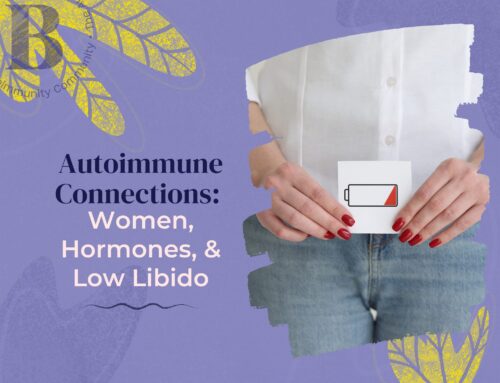
Lost Your Mojo? 4 Ways Autoimmunity Impacts Sex Drive
Lost your sex drive mysteriously? One moment vibrant, the next a dimmed zest for life, impacted by autoimmunity.
Let’s face it: For many of us living with autoimmune conditions, this mojo mystery may sound all too familiar.
Autoimmunity isn’t just about the physical symptoms that can leave you feeling worn out and achy.
It’s also about the unexpected ways it can sneak into other parts of your life, including your sexual well-being.
It’s as if your immune system decided to throw a wrench into the works, leaving you wondering where your libido wandered off to.
The good news is that understanding the connection between autoimmunity and sex drive can empower you to take steps towards reclaiming your vitality.
So, let’s explore four surprising ways autoimmunity can impact your sex drive and, more importantly, what you can do about it.
1. Impact of Pain on Sex Drive
Imagine you’re gearing up for a cozy night in, but instead of feeling excited, your joints are throbbing, your back aches, and even your neck feels like it’s carrying the weight of the world.
Physical pain can be a real mood killer, and for those with autoimmune conditions, it’s a frequent companion.
Joint and Muscle Pain
When every movement sends a jolt of pain through your body, it’s no surprise that the idea of engaging in sexual activity might be the last thing on your mind.
Autoimmune diseases like rheumatoid arthritis and lupus often cause inflammation and pain in joints and muscles, making even the gentlest touch feel uncomfortable.
It’s like trying to dance when your feet are on fire—hardly the setting for a romantic evening.
Vaginal Pain and Dryness
For many women, autoimmune conditions can also affect vaginal health, leading to pain and dryness.
These issues stem from the body’s inability to produce adequate lubrication, a common problem in conditions like Sjogren’s syndrome and certain forms of lupus.
The discomfort can make sexual activity feel more like a chore than a joy, causing a significant drop in libido.
It’s not just a matter of physical discomfort but also the emotional strain that comes with it.
Neuropathy and Nerve Pain
Neuropathy, or nerve pain, can take a heavy toll on your sexual desire.
Conditions like multiple sclerosis (MS), diabetes, and lupus can cause nerve damage leading to neuropathy.
Specifically, conditions like vulvodynia cause chronic pain in the vulvar area, which can include a burning sensation, numbness, or even sharp pain.
This not only makes sexual activity painful but also diminishes the pleasure and responsiveness that should come with it.
2. The Unseen Impact: Role of GI Symptoms on Libido
Ever tried to feel romantic when your stomach feels like it’s hosting a wrestling match?
Gastrointestinal (GI) symptoms can be an unexpected but powerful roadblock to intimacy.
For those grappling with autoimmune conditions, persistent GI issues can significantly dampen, if not choke out, the desire for sexual activity.
The GI Symphony: Nausea, Bloating, and More
Nausea, bloating, gas, diarrhea, and constipation—these unwelcome guests can crash any intimate moment.
Autoimmune diseases like celiac disease, Crohn’s disease, and irritable bowel syndrome (IBS) often bring these symptoms along for the ride.
It’s tough to feel sexy when you’re constantly worrying about an upset stomach or a sudden dash to the bathroom.
The physical discomfort from these symptoms can overshadow any thoughts of intimacy, making it hard to relax and enjoy the moment.
3. Food Sensitivities and Elimination Diets
Have you ever felt like food was the enemy? For many people with autoimmune conditions, managing food sensitivities can turn mealtime into a battlefield, and this struggle can spill over into other areas of life, including sexual well-being.
Food Trauma and Anxiety
Prolonged elimination diets, where you cut out certain foods to see if they’re causing problems, can sometimes lead to food trauma.
This is when you become so anxious about what you’re eating that it affects your overall happiness and health.
Imagine constantly worrying if that piece of bread or that slice of cheese will trigger a flare-up.
This kind of fear-based relationship with food can drain your energy and enthusiasm for life, including your libido.
When your mind is preoccupied with food fears, it’s hard to relax and enjoy intimate moments.
Reintroducing Safe Foods
Once you have a clearer picture of your food sensitivities, reintroducing safe foods can be a game-changer.
Enjoying a varied diet not only nourishes your body but also lifts your spirits.
Imagine the joy of rediscovering a favorite dish that you thought you had to give up forever.
Reducing food-related anxiety and embracing a balanced diet can improve your overall well-being, which in turn can positively affect your libido.
When you’re not constantly worried about food, you can focus more on the pleasures of life, including those special moments with your partner.
4. Impact of Emotional and Psychological Factors on Libido
Living with an autoimmune condition can sometimes feel like riding an emotional rollercoaster with no end in sight.
The constant battle with physical symptoms can take a heavy toll on your mental well-being, leading to stress, anxiety, and even depression.
These emotional struggles can have a profound impact on your libido, turning what should be a source of pleasure into another area of concern.
Emotional Stress
Autoimmune diseases often come with a host of unpredictable symptoms and flare-ups that can cause significant emotional stress.
The anxiety of not knowing when the next flare-up will occur, coupled with the frustration of dealing with chronic pain and fatigue, can sap your energy and desire for intimacy.
It’s hard to feel sexy when you’re constantly worried about your health.
Anxiety and Depression
Anxiety and depression are common companions for many living with autoimmune conditions.
The relentless nature of these diseases can make you feel trapped in a cycle of despair, which can severely dampen your libido.
It’s like trying to find sunshine on a stormy day—the desire for intimacy gets lost in the fog of mental health struggles, but there is hope…
Strategies for Managing Impacts of Autoimmunity on Sex Drive
Living with an autoimmune condition can pose many challenges. Here are effective strategies to help manage these impacts of autoimmunity and improve your sex drive.
1. Pain
Pain Management Protocols:
- Utilize comprehensive pain management protocols that address the root causes of pain, not just the symptoms. This could include medication, physical therapy, and alternative treatments like acupuncture.
Supplements for Pain Relief:
- Consider collagen supplements and omega-3 fatty acids, which can help reduce inflammation and improve joint health, potentially easing vaginal dryness and enhancing overall mucosal health.
Lubrication for Comfort:
- Use silicone-based lubricants, which provide longer-lasting comfort during sexual activity compared to water-based options.
Sexual Ergonomic Aids:
- Explore sexual ergonomic aids to help with positioning and reduce pain during sex. These aids can include supportive pillows and wedges designed to minimize discomfort.
2. GI Symptoms
Improving Digestion:
- Enhance digestion with multiphasic digestive enzymes and proper chewing techniques. Taking the time to chew thoroughly can significantly reduce digestive discomfort.
- Multiphasic digestive enzymes refer to the different types of enzymes that are produced and released at various stages of the digestive process. These enzymes help break down the food we eat into smaller molecules that can be absorbed and used by our bodies.
Food Mapping:
- Explore food mapping to identify and eliminate specific food triggers. By pinpointing exact foods that cause issues, you can reduce GI symptoms and food-related anxiety without unnecessary dietary restrictions.
- Food mapping is a technique to identify foods that may trigger or worsen autoimmune conditions. By tracking what you eat and any symptoms that follow, you can uncover patterns that help manage your health better.
Here’s How It Works:
3. Food Sensitivities
Balanced Approach to Diet:
- Avoid prolonged elimination diets to prevent food trauma and anxiety. Instead, focus on identifying specific sensitivities through food mapping.
Reintroduction of Safe Foods:
- Gradually reintroduce safe foods to enjoy a varied diet. This can help reduce food-related anxiety and improve overall well-being. A diverse diet not only enhances meal enjoyment but also reduces psychological stress.
4. Emotional and Psychological Factors
Seeking Counseling or Therapy:
-
- Counseling or therapy can be incredibly beneficial in addressing the emotional and psychological effects of living with an autoimmune condition. Therapy provides coping strategies and emotional support, helping you navigate the emotional rollercoaster.
- Questions to ask when considering counseling or therapy:
- What are my specific goals for therapy and what do I hope to achieve or change?
- What type of therapist or counseling approach do I feel most comfortable with (e.g. age, gender, specialty, therapeutic style)?
- How frequently will I need to attend sessions and what is the typical duration of treatment for my concerns?
- What are the therapist’s credentials, level of experience, and approach to confidentiality?
- How will the costs and insurance coverage be handled?
Building a Supportive Network:
- Join support groups or online communities like BrightlyThrive™ to connect with others facing similar challenges. Sharing experiences can reduce feelings of isolation and provide emotional relief, enhancing your overall well-being.
Self-Care Practices:
- Engage in self-care practices that nurture your mental health. Mindfulness, meditation, and hobbies that bring you joy can significantly improve your emotional state.
Final Thoughts
Managing an autoimmune condition requires a multifaceted approach, but with the right strategies, you can reclaim your sexual well-being and overall quality of life.
By addressing pain, GI symptoms, food sensitivities, and emotional factors, you can take proactive steps towards a healthier, more fulfilling life.
Remember, you are not alone in this journey—there are lots of expert resources and dedicated communities like BrightlyThrive, The Autoimmunity Community™, ready to support you every step of the way. Become a member today!
Feel free to share your experiences and tips, and let’s continue building a supportive network that empowers every woman to thrive despite autoimmune challenges.
References
Acabchuk, R. L., Kamath, J., Salamone, J. D., & Johnson, B. T. (2017). Stress and chronic illness: The inflammatory pathway. Social Science & Medicine, 185, 166–170. https://doi.org/10.1016/j.socscimed.2017.04.039
Understanding Autoimmune Diseases. (2024, June 17). NIH News in Health. https://newsinhealth.nih.gov/2022/06/understanding-autoimmune-diseases
N, S. (2024, May 29). How Are Autoimmune Diseases and Gynecological Problems Co-related? https://www.icliniq.com/articles/womens-health/gynecological-disorders-and-autoimmune-diseases-understanding-the-interplay
Negrini, S., Emmi, G., Greco, M., Borro, M., Sardanelli, F., Murdaca, G., Indiveri, F., & Puppo, F. (2021). Sjögren’s syndrome: a systemic autoimmune disease. Clinical and Experimental Medicine, 22(1), 9–25. https://doi.org/10.1007/s10238-021-00728-6
Sex and Neuropathy » Mayo Clinic Connect. (n.d.). Mayo Clinic Connect. https://connect.mayoclinic.org/discussion/sex-and-neuropathy/
Website, N. (2024, January 17). Vulvodynia (vulval pain). nhs.uk. https://www.nhs.uk/conditions/vulvodynia/
Does Autoimmune Disease Affect Your Libido? What You Should Know. (n.d.-b). WellTheory. https://www.welltheory.com/resources/autoimmunity-and-libido
Digital, C. (2023, March 17). How Autoimmune Diseases Affect the Gut. Northeast Digestive. https://northeastdigestive.com/blog/how-autoimmune-diseases-affect-the-gut/
Gordon, S. (2024, March 31). For Those With Autoimmune Diseases, Mental Health Is Often Overlooked. Health. https://www.health.com/autoimmune-disease-mental-illness-7569310
Nielsen, A., Dusek, J. A., Taylor-Swanson, L., & Tick, H. (2022). Acupuncture Therapy as an Evidence-Based Nonpharmacologic Strategy for Comprehensive Acute Pain Care: The Academic Consortium Pain Task Force White Paper Update. Pain Medicine, 23(9), 1582–1612. https://doi.org/10.1093/pm/pnac056
Rd, R. a. M. (2021, March 10). 6 Vitamins That May Help with Vaginal Dryness. Healthline. https://www.healthline.com/nutrition/vitamins-to-increase-female-lubrication#2.-Vitamin-D
Dezzutti, C. S., Brown, E. R., Moncla, B., Russo, J., Cost, M., Wang, L., Uranker, K., Ayudhya, R. P. K. N., Pryke, K., Pickett, J., LeBlanc, M. A., & Rohan, L. C. (2012). Is Wetter Better? An Evaluation of Over-the-Counter Personal Lubricants for Safety and Anti-HIV-1 Activity. PloS One, 7(11), e48328. https://doi.org/10.1371/journal.pone.0048328
HealthNews. (n.d.). Chewing and digestion: What is the link? Retrieved from https://healthnews.com/family-health/healthy-living/chewing-and-digestion-what-is-the-link/
Bolen, B. (2024, June 6). Digestive Enzymes: Types and Function. Verywell Health. https://www.verywellhealth.com/what-are-digestive-enzymes-1945036
Naidoo, U. (2020, October 27). Eating well to help manage anxiety: Your questions answered. Harvard Health. https://www.health.harvard.edu/blog/eating-well-to-help-manage-anxiety-your-questions-answered-2018031413460
TAGS:
CATEGORIES:





